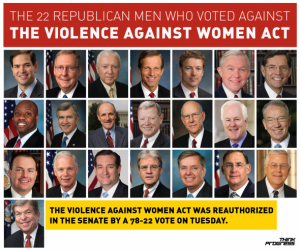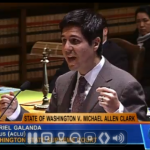 1o. “House Republican leadership just doesn’t get it.” – Sen. Patty Murray.
9. The incidence of violence against Native women isn’t that bad– House Committee on the Judiciary, H.R. Rep. No. 112-480, at 227 (2012). This is absolutely false. Native American women suffer violent crime at the highest rates in the United States.
1o. “House Republican leadership just doesn’t get it.” – Sen. Patty Murray.
9. The incidence of violence against Native women isn’t that bad– House Committee on the Judiciary, H.R. Rep. No. 112-480, at 227 (2012). This is absolutely false. Native American women suffer violent crime at the highest rates in the United States.
8. “Legitimate rape” – Rep. Todd Akin.
7. “The non-Indian doesn't get a fair trial" in tribal courts – Sen. Chuck Grassley. This is also false. Numerous studies have found the guarantees and traditions of fairness in tribal statutory and common law are equivalent to – and, indeed, sometimes even go far beyond – those granted in state and federal forums. And if there is any deviation, the federal Indian Civil Rights Act, 25 U.S.C. 1301-1303, assures non-Indian domestic offenders due process of law in tribal courts.
6. “If non-tribe members are tried in tribal courts, they are not protected by the United States Constitution and they have no right of appeal to the federal courts” – Sen. John Cornyn. This too is false. A non-member domestic criminal can seek a writ of habeas corpus in the U.S. District Court.
5. A tribal jurisdictional fix “would likely be ruled unconstitutional by the courts.” – Sen. John Barasso. Congressional recognition of inherent tribal power to prosecute non-Indian domestic abusers is constitutional, as determined by the Supreme Court in U.S. v. Lara (2004). There is always the chance that the court will overrule Lara and change the state of the law, but to say that a law is currently unconstitutional because of something that the court might do in the future is nonsensical.
4. They now have a token female to hide behind: Rep. Cathy McMorris Rodgers. McMorris Rodgers has recently voiced opposition to S. 47, arguing that the additional protections for Native Americans, immigrants, and gays and lesbians have no place in the law. McMorris Rodgers has in the past paid lip service to the tribal provisions, stating that she would “reach out to other GOP congresswomen to urge their support for the inclusive VAWA bill.” Apparently, she has now abandoned this position.
3. Political Misogyny. This is a front in the very real, calculated GOP war against unmarried women, who after all, constitute the Democrat base. In the presidential election, married women backed Romney, 53 percent to 46 percent, while unmarried women chose Obama 68 percent to 30 percent. Political expediency has incented GOP’s anti-woman platform because unmarried women are opposed to Republicans’ policy goals on rape, birth control, abortion, equal pay, employment discrimination, and so on.
2. Because they are Native American women. Republicans believe they can ignore issues affecting Native women, and they may be right. Unless Indian Country and its allies stand up to the GOP's anti-woman agenda, Republicans will succeed in further marginalizing Native women. Indeed, the GOP will prevail without even losing votes from their base, which, to be sure, includes few if any Indian women.
1. Republicans are not being honest. There is no possible reasoned stance against VAWA. It’s Pascal’s Wager in the domestic violence context: the downside of failing to act on domestic violence in Indian Country outweighs any possible harm caused by acting. There must be another reason for their opposition. One they refuse to discuss in public (see #2).
Gabriel S. Galanda, Ryan D. Dreveskracht, and Anthony S. Broadman practice law with Galanda Broadman, PLLC. They pride themselves as "an Indian Country law firm," representing tribal governments, businesses and members in all varieties of dispute and business dealing. Ryan's article, "Congress' Treatment of the Violence Against Women Act: Adding Insult to Native Women's Injury," will be featured in the next edition of the University of Miami Race and Social Justice Law Review.




 A few excerpts:
A few excerpts:
 On the one side, at least according to some recent media depictions, it appears that tribal governments and their citizens are adamantly opposed to any energy development on their lands. All told, however, this couldn’t be further from the truth. Section A of this article will explain that tribes merely seek a seat at the table when decisions are made regarding developments that will adversely affect their lands or areas of cultural significance, and why this is important. Indeed, contrary to being opposed to alternative energy development, Tribes are very actively seeking to develop their lands, and to do so in a manner that is consistent with their cultures and traditions. But, large-scale alternative energy projects are virtually absent from Indian country. Thus, Section B of this article will discuss what is hindering these projects from coming to fruition. Finally, Section C of the article will discuss what Congress is – and is not – doing regarding the two sides of the coin.
On the one side, at least according to some recent media depictions, it appears that tribal governments and their citizens are adamantly opposed to any energy development on their lands. All told, however, this couldn’t be further from the truth. Section A of this article will explain that tribes merely seek a seat at the table when decisions are made regarding developments that will adversely affect their lands or areas of cultural significance, and why this is important. Indeed, contrary to being opposed to alternative energy development, Tribes are very actively seeking to develop their lands, and to do so in a manner that is consistent with their cultures and traditions. But, large-scale alternative energy projects are virtually absent from Indian country. Thus, Section B of this article will discuss what is hindering these projects from coming to fruition. Finally, Section C of the article will discuss what Congress is – and is not – doing regarding the two sides of the coin.






